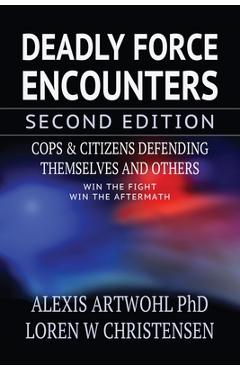Deadly Force Encounters, Second Edition: Cops and Citizens Defending Themselves and Others - Loren W. Christensen

Detalii Deadly Force Encounters, Second Edition:
libris.ro
174.02 Lei
193.36 Lei
Social Science
Loren W. Christensen
Deadly Force Encounters, Second Edition: - Disponibil la libris.ro
Pe YEO găsești Deadly Force Encounters, Second Edition: de la Loren W. Christensen, în categoria Social Science.
Indiferent de nevoile tale, Deadly Force Encounters, Second Edition: Cops and Citizens Defending Themselves and Others - Loren W. Christensen din categoria Social Science îți poate aduce un echilibru perfect între calitate și preț, cu avantaje practice și moderne.
Preț: 174.02 Lei
Caracteristicile produsului Deadly Force Encounters, Second Edition:
- Brand: Loren W. Christensen
- Categoria: Social Science
- Magazin: libris.ro
- Ultima actualizare: 28-10-2025 01:22:05
Comandă Deadly Force Encounters, Second Edition: Online, Simplu și Rapid
Prin intermediul platformei YEO, poți comanda Deadly Force Encounters, Second Edition: de la libris.ro rapid și în siguranță. Bucură-te de o experiență de cumpărături online optimizată și descoperă cele mai bune oferte actualizate constant.
Descriere magazin:
In 1997, renown police psychologist Dr. Alexis Artwohl and police officer Loren W. Christensen (co-author of On Combat) wrote Deadly Force Encounters: What Cops Need to Know to Mentally and Physically Prepare for and Survive a Gunfight. It quickly became an authoritative book for police officers, citizens legally carrying a concealed firearm, and police academies. The greatly expanded scientific research, stories, and analysis in this second edition, Deadly Force Encounters: Cops and Citizens Defending Themselves and Others, focus on the most infrequent but most challenging part of the police profession: the use of deadly force. This book is not about specific laws, tactics, or equipment, but how the science of human performance influences the people behind the badge. This knowledge is crucial for physical, legal, and emotional survival. Citizens, armed or not, will benefit from the information to help them survive violent threats. When seconds count, the police are only minutes away. If citizens use deadly force to survive, this book will help them prepare for the legal and emotional challenges of the aftermath. Although the focus is about savings lives when threatened with violence, much of the information is relevant to people facing a wide variety of extreme events and everyday dangers. All readers who want facts about violent encounters rather than myth and ill-informed hyperbole will find this book a useful reference. Foreward by Laurence Miller, Ph.D., clinical, forensic, and police psychologist, and author of the upcoming book: The Psychology of Police Deadly Force Encounters: Science, Practice, and Policy (Charles C. Thomas, 2020): Already a classic, the second edition of Deadly Force Encounters expands and deepens the empirical, theoretical, and practical knowledge base of police deadly force encounters for the challenges of the 21st century. Written by co-authors who skillfully combine in-depth scholarship with on-the-street experience, this is an authoritative guide that every law enforcement supervisor, policymaker, and rank and file cop should be familiar with and have on hand for day-to-day guidance. You won\'t just read this book; you\'ll deploy it as a vital work tool to make you safer, smarter, and more resilient in the complex and sometimes contentious climate of modern policing. In a field often plagued with subjective impressions, anecdotal mythology, and political agendas, this volume stands ou

Produse asemănătoare
Produse marca Loren W. Christensen

Deadly Force Encounters, Second Edition: Cops and Citizens Defending Themselves and Others - Loren W. Christensen
![]() libris.ro
libris.ro
Actualizat in 28/10/2025
174.02 Lei

Timing in the Fighting Arts: How to Win a Fight with Speed, Power, and Technique - Loren W. Christensen
![]() libris.ro
libris.ro
Actualizat in 28/10/2025
111.32 Lei